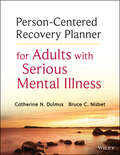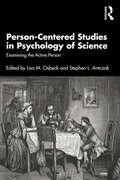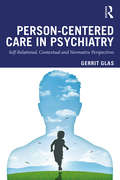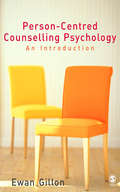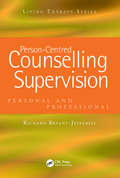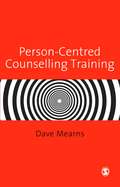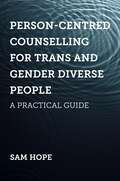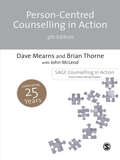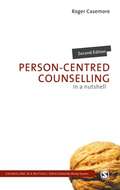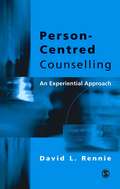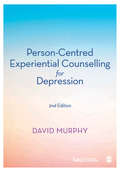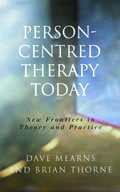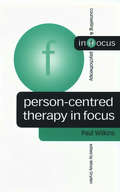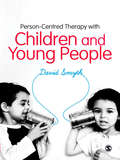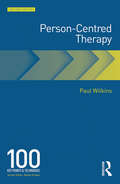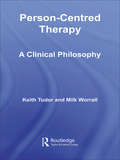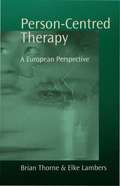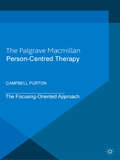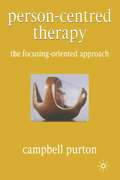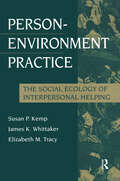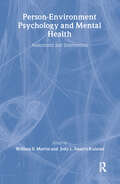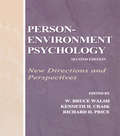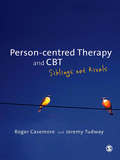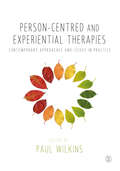- Table View
- List View
Person-Centered Recovery Planner for Adults with Serious Mental Illness
by Catherine N. Dulmus Bruce C. Nisbet"Both timely and critical for recovery-oriented practice, this book provides practitioners with the focused, essential knowledge and skills to be truly person-centered and recovery-oriented when supporting an individual's recovery journey. Dulmus and Nisbet have provided the field with an overdue practical resource. Making the recovery planner's best practice individual recovery plan format available on CD-ROM is brilliant, and every agency will want to incorporate it into its EMR." —Linda Rosenberg, President/CEO National Council for Community Behavioral Healthcare, Washington, D.C. "This is a practical and useful tool for case managers and community support workers who are assisting people with serious mental illness toward recovery. Working in a person-centered fashion is what our consumers want and expect, but to date, there have been few published tools with practical value for frontline staff. This resource is timely and relevant." —Michael F. Hogan, PhD, Hogan Health Solutions, Delmar, New York; former NYS Commissioner of Mental Health and Chair of the President's New Freedom Commission on Mental Health, 2002–2003 Proven guidance for creating effective person-centered plans that facilitate the recovery process for individuals with serious mental illness Recent national and international mental health policy is promoting service delivery models that incorporate person-centered and recovery-oriented approaches, in which individuals are in the lead role, defining their own goals for their individualized recovery plans. Person-Centered Recovery Planner for Adults with Serious Mental Illness provides mental health practitioners with a useful resource to implement person-centered planning within a recovery framework when working with individuals with a serious mental illness. Providing a succinct overview of the historical roots, philosophy, and practice of person-centered recovery, Person-Centered Recovery Planner for Adults with Serious Mental Illness is organized around the three stages of recovery—Beginnings, Moving Forward, and Leaving Your Practitioner Behind—yet still allows both the individual and practitioner to revisit any of the three stages during the ebb and flow of an individual's recovery journey. Sample recovery plans are included, covering the individual's status, personal priorities, short-term objectives, and recovery steps, and are organized around common recovery goals including: Self-advocacy Family relationships Health and wellness Community involvement Stress management Relapse prevention Personal crisis planning Transportation Social relationships Meaningful activities Life skills A companion CD-ROM provides all of the plans found in the book in an easily customizable word-processing format. Person-Centered Recovery Planner for Adults with Serious Mental Illness assists practitioners in becoming effective person-centered facilitators and advocates for recovery that meaningfully supports individuals in achieving their hopes and dreams.
Person-Centered Studies in Psychology of Science: Examining the Active Person
by Stephen L. Antczak Lisa M OsbeckThis unique collection examines "the acting person" as an important unit of analysis for science studies, using an integrative approach of in-depth case studies to explore the cognitive, social, cultural, and personal dimensions of a series of key figures in the sciences, from Goethe to Kepler to Rachel Carson. Opening up key questions about what science is, and what comprises a scientist, the volume offers an accessible introductory approach to psychology of science, a growing area in Science and Technology Studies (STS). Case studies focus on the psychological contexts of the contributions for which the scientist is known. Without diminishing its epistemic authority, science is presented as a psychologically saturated human activity, one that is especially illustrative of the way social, cognitive, and personal processes intermingle to both facilitate and impede scientific accomplishment. Each case study ends with a set of discussion questions, providing a valuable resource for student reflection and discussion, inviting analysis of similarities and differences in science in the context of very different lives and different projects. Person-Centered Studies in Psychology of Science is essential reading for scholars and graduates interested in the psychology of science, personality theory, social, or cognitive psychology, general psychologists, and theoretical psychologists.
Person-Centred Care in Psychiatry: Self-Relational, Contextual and Normative Perspectives
by Gerrit GlasOne of the paradoxes about psychiatry is that we have never known more about and better treated mental disorders, yet there exists so much unease about the practice of mental healthcare. Patients feel still stigmatized, psychiatrists are struggling with their roles in a rapidly changing system of healthcare, there is lack of consensus about what mental disorders are and what the focus of psychiatry should be. Person-Centred Care in Psychiatry: Self Relational, Contextual and Normative Perspectives offers a distinctive approach to two important linked conceptual issues in psychiatry: the relation between self, context, and psychopathology; and the intrinsic normativity of psychiatry as a practice. Divided in two parts, this book shows how the clinical conception of psychopathology and psychiatry as normative practice are intrinsically connected, and how the normative practice model can be conceived as a natural extension of the analysis of the web of relations that sustain illness behaviour as well as professional role fulfilment. Person-Centred Care in Psychiatry brings these topics together for the first time against the backdrop of unease about scientistic tendencies within psychiatry in an interconnected discussion that will be of interest to academics and professionals with an interest in the philosophy of psychology, psychiatry and mental health-care.
Person-Centred Counselling Psychology: An Introduction (Counselling And Psychotherapy Ser.)
by Dr Ewan Gillon'Not only is this the first key text on person-centred counselling psychology, but one of the best introductions to the approach. Gillon combines an in-depth understanding of the person-centred field with a highly accessible writing style to produce a book that will be of enormous value to anyone wanting to practice person-centred therapy. Essential reading for trainee and practising counselling psychologists with an interest in the person-centred approach and highly recommended for counsellors and psychotherapists of all orientations' - Mick Cooper, Professor of Counselling, Counselling Unit, University of Strathclyde Person-Centred Counselling Psychology: An Introduction is an introduction to the philosophy, theory and practice of the person-centred approach. Focusing on the psychological underpinnings of the approach, Ewan Gillon describes the theory of personality on which it is based and the nature of the therapeutic which is characterised by o unconditional positive regard o empathy o congruence. The book shows how the person-centred approach relates to others within counselling psychology and to contemporary practices in mental health generally. It also gives guidance to readers on the approach's research tradition as well as considering key issues for those wishing to train and work as a person-centred practitioner. As such, it is designed to be an applied, accessible text, providing a dialogue between the psychological basis of person-centred therapy and its application within the real world. As well as psychology students, it will be of interest to those from other disciplines, counselling trainees, those within the caring professions, and person-centred therapists from a non-psychological background. Ewan Gillon is Director of The Edinburgh Psychology Centre and Lecturer in Counselling Psychology at Glasgow Caledonian University.
Person-Centred Counselling Supervision: Personal and Professional (Living Therapies Series)
by Richard Bryant-JefferiesEach preceding book in the Living Therapy series provides a demonstration of the application of the person-centred approach to counselling and psychotherapy to clients presenting with particular issues. To complement these, this book focuses more on the supervisory element of the therapeutic process. It brings together examples of supervision sessions from the Living Therapy series, and presents each one as an example of person-centred supervisory practice of person-centred counselling. The supervision sessions deal with a range of issues that arise when working with clients who are seeking counselling in order to resolve difficulties from a wide range of difficult human experience. Each supervision session is introduced with a summary of the background, and points for discussion are included at the end of each chapter to stimulate further thought and debate. The book does not attempt to demonstrate a definitive way to apply person-centred principles to supervision, but does demonstrate core principles. It will prove valuable to experienced and novice supervisors, and to those uncertain about supervising counsellors working in areas outside their own professional experience. It should also be read by counsellors in training who are preparing to be supervised, for whom the book offers insights into this collaborative process.
Person-Centred Counselling Training
by Professor Dave MearnsPerson-centred counselling probably requires more training - and a greater intensity of training - than most other mainstream counselling approaches, but until now no one book has concentrated solely on the principles, practices and requirements of training person-centred counsellors. <p><p> Dave Mearns has drawn on the lived experiences of both trainers and trainees to demonstrate the potential range and importance of training in this field. The material covered includes selecting and supporting trainers, selecting course members, skills development, supervision and other professional issues - essential features of all counsellor training, but of particular relevance to the person-centred approach. Written expressly for both trainees and trainers, this book also extends and develops current thinking within the approach, and will be a valuable resource for all person-centred practitioners.
Person-Centred Counselling for Trans and Gender Diverse People: A Practical Guide
by Sam HopeTrans clients are frequently doubted, misunderstood, infantilised and judged by professionals, and this book presents an approach that ensures psychological wellbeing and trust is built between counsellor and client. This person-centred, affirmative approach is based around unlearning assumptions about gender and destabilising professionals' ideas of 'knowing better' than, and judging the client, so that they can forge a relationship and connection that is on an equal footing. The book explores a range of topics such as the overlap of gender diversity and autism, sex and sexuality, intersectionality, unconscious bias and reflective practice. Essential reading for professionals that want to support trans people's mental health and social wellbeing.
Person-Centred Counselling in Action (Counselling in Action)
by John Mcleod Dave Mearns Brian ThorneIt is now 25 years since the first edition of Person-Centred Counselling in Action appeared, offering the definitive exposition of the theory and practice of the person-centred approach. Since then the book has supported and inspired hundreds of thousands of trainees and practitioners worldwide. This important Fourth Edition maintains the book's accessibility, clarity and verve whilst incorporating new developments in the approach. John McLeod joins authors Dave Mearns and Brian Thorne to contribute an exciting new chapter on research relevant to the person-centred field. Person-Centred Counselling in Action, Fourth Edition will be an invaluable resource for those embarking on their first stages of training. Well-established practitioners and even seasoned scholars will continue to find much to interest and stimulate them. Dave Mearns is professor of counselling and retired Director of the Counselling Unit of the University of Strathclyde. He has written seven books including Working at Relational Depth in Counselling and Psychotherapy (with Mick Cooper) and is co-editor of the international journal, Person-Centered and Experiential Psychotherapies. Brian Thorne is Emeritus Professor of Counselling at the University of East Anglia, Norwich where he was previously Director of Counselling and of the Centre for Counselling Studies. He is also a Co-founder of the Norwich Centre and continues to work there as a Professional Fellow. John McLeod is Emeritus Professor of Counselling at the University of Abertay Dundee and adjunct Professor of Psychology at the University of Oslo, Norway.
Person-Centred Counselling in a Nutshell (Counselling in a Nutshell)
by Roger CasemorePerson-Centred Counselling in a Nutshell is a short, accessible guide to one of the most popular approaches to counselling. Using examples drawn from practice, Roger Casemore outlines, in a clear, jargon-free style, the main principles of the person-centred approach, using the core therapeutic conditions: - congruence - unconditional regard - empathy This revised and updated second edition includes new material on professional issues, on the use of person-centred counselling in short-term therapy, and on the wider application of the person-centred approach in other settings. Providing a concise introduction to the theory and practice of person-centred counselling, Person-Centred Counselling in a Nutshell is the ideal place to start for anyone reading about the approach for the first time. Roger Casemore is Senior Teaching Fellow and Director of Counselling courses at University of Warwick
Person-Centred Counselling: An Experiential Approach (Clinical And Counseling Ser.)
by David L. Rennie`This book offers a truly engaging "read". The writing style is good and it gives the reader a wide range of perspectives, from the meta-theoretical to the concrete practical experience of clients and counsellors.... David Rennie′s book serves to continue the development as well as the exposition of the person-centred approach to counselling′ - British Journal of Guidance and Counselling `This is a very good book... clearly within the humanistic/experiential tradition... It seems to me to be very important that this kind of research continues - it is the raw data of the counselling profession′ - Person-Centred Practice This book contains powerful new ideas about person-centred theory and practice. Supported by intensive qualitative research into the client′s experience of counselling, the book highlights the significance and pervasiveness of reflexivity - defined as self-awareness and agency within that self-awareness - and explores surprising ways in which clients contribute reflexively to the counselling process. Vivid examples highlight activities, show the therapy in action and illustrate how counsellors can use their own experiences creatively to facilitate their attunement to themselves, their clients and their relationships with them. The theoretical framework covers matters such as the use of images and metaphor, counsellor transparency and the assistance of clients′ agency. Emphasis is placed on the client/counsellor relationship through such crucial areas as the working alliance, power dynamics and metacommunication.
Person-Centred Experiential Counselling for Depression: A manual for training and practice
by David MurphyThis practical book focuses on humanistic counselling as an evidence-based psychological intervention and it is an essential read for trainees wishing to work in public health settings. Coverage includes: evidence-based practice and person-centered and experiential therapies the counselling for depression competence framework in-depth case studies illustrating Counselling for Depression in practice training, supervision and research The book also includes research data supporting the approach, and sources used in developing the humanistic competence framework. Vital reading for those taking counselling for depression training or a humanistic counselling and psychotherapy course, as well as for those already working within the NHS and wish to enhance their practice.
Person-Centred Experiential Counselling for Depression: A manual for training and practice
by David MurphyThis practical book focuses on humanistic counselling as an evidence-based psychological intervention and it is an essential read for trainees wishing to work in public health settings. Coverage includes: evidence-based practice and person-centered and experiential therapies the counselling for depression competence framework in-depth case studies illustrating Counselling for Depression in practice training, supervision and research The book also includes research data supporting the approach, and sources used in developing the humanistic competence framework. Vital reading for those taking counselling for depression training or a humanistic counselling and psychotherapy course, as well as for those already working within the NHS and wish to enhance their practice.
Person-Centred Therapy Today: New Frontiers in Theory and Practice
by Dave Mearns Brian Thorne`This is a book that is rooted in the origins of person-centred therapy but stands at the cutting edge of new ideas developing in this tradition. It will reinvigorate those of us already immersed in this tradition. It should convince newcomers of the vitality and potential of this approach to therapy' - Tim Bond, University of Bristol `This book is clearly a labour of love by two authors with unique abilities and unparalleled experience: readers will be educated, inspired and encouraged in their own dialogue with the person-centred approach'- Charles J O'Leary, Denver, Colorado `Mearns and Thorne have done Rogers proud in suggesting how person-centred theory and practice can, without losing its essence, evolve in new directions' - Richard Nelson-Jones, Director of the Humanistic Cognitive Institute, Chiang Mai Person-Centred Therapy Today represents a significant contribution to the development of the person-centred approach. It will be read by teachers and students of counselling and psychology who wish to keep their knowledge of the approach fully up to date and by all who consider themselves to be person-centred in their approach to helping clients.
Person-Centred Therapy in Focus (Counselling & Psychotherapy in Focus Series)
by Paul WilkinsPerson-Centred Therapy in Focus provides a much-needed exploration of the criticisms levelled against one of the most widespread forms of therapeutic practice. Characterized by its critics as theoretically `light', culturally biased and limited in application, until now the person-centred approach has had comparatively little written in its defence. Paul Wilkins provides a rigorous and systematic response to the critics, drawing not only on the work of Carl Rogers, but also of those central to more recent developments in theory and practice (including Goff Barrett-Lennard, Dave Mearns, Jerold Bozarth, Germain Leitauer and Brian Thorne). It traces the epistemological foundations of person-centred therapy and places the approach in its social and political context. Examining the central tenets of the approach, each chapter sets out concisely the criticisms and then counters these with arguments from the person-centred perspective. Chapters cover debates in relation to: - the model of the person - self-actualization - the core conditions - non-directivity - resistance to psychopathology - reflection, and - boundary issues. Person-Centred Therapy in Focus fulfills two important purposes: firstly to answer the criticisms of those who have attacked the person-centred approach and secondly to cultivate a greater critical awareness and understanding within the approach itself. As such it makes a significant contribution to the person-centred literature and provides an excellent resource for use in training.
Person-Centred Therapy with Children and Young People
by David SmythThis engaging new book presents a ′child-centred′ model of therapy that is thoroughly person-centred in its values. Establishing the roots of child-centred therapy in both child development theories and the Rogerian model, David Smyth demonstrates that counselling the person-centred way is exceptionally relevant to young people. The book further develops child-centred therapy theory and practice, applying the model to real-life practice with children and young people, whether in play, school, organisations or with special needs groups. It also explores the complex professional issues so critical with this age group, including challenging boundaries, establishing an effective relationship with parents and other primary carers, legal and ethical considerations, and multi-professional practice. The author′s warm, accessible style conveys his passionate conviction that the person-centred approach can provide a strong foundation for child therapy practice. His book introduces humanistic counselling and psychotherapy trainees - as well as adult-trained therapists - to the particular requirements of working with children and young people, and also illustrates the value of using a ′child-centred′ approach for those who might already be working with children in mental health settings. Equally, this volume can be used for professional development in many disciplines including adult trained therapists who want to extend their knowledge of people prior to reaching adulthood.
Person-Centred Therapy: 100 Key Points (100 Key Points)
by Paul WilkinsPerson-centred therapy, rooted in the experience and ideas of the eminent psychotherapist Carl Rogers, is widely practised in the UK and throughout the world. It has applications in health and social care, the voluntary sector and is relevant to work with people who are severely mentally and emotionally distressed. As well as being a valuable sourcebook and offering a comprehensive overview, this edition includes updated references and a new section on recent developments and advances. The book begins with a consideration of the principles and philosophy underpinning person-centred therapy before moving to a comprehensive discussion of the classical theory upon which practice is based. Further areas of discussion include: The model of the person, including the origins of mental and emotional distress The process of constructive change A review of revisions of and additions to person-centred theory Child development, styles of processing and configurations of self The quality of presence and working at relational depth Criticisms of the approach are addressed and rebutted and the application of theory to practice is discussed. The new final section is concerned with advances and developments in theory and practice including: Counselling for Depression The Social Dimension to Person-Centred Therapy Person-Centred Practice with People experiencing Severe and Enduring Distress and at the ‘Difficult Edge’ A Review of Research Throughout the book, attention is drawn to the wider person-centred literature to which it is a valuable key. Person-Centred Therapy will be of particular use to students, scholars and practitioners of person-centred therapy as well as to anyone who wants to know more about one of the major psychotherapeutic modalities.
Person-Centred Therapy: A Clinical Philosophy (Advancing Theory in Therapy)
by Keith Tudor Mike WorrallThe person-centred approach is one of the most popular, enduring and respected approaches to psychotherapy and counselling. Person-Centred Therapy returns to its original formulations to define it as radically different from other self-oriented therapies. Keith Tudor and Mike Worrall draw on a wealth of experience as practitioners, a deep knowledge of the approach and its history, and a broad and inclusive awareness of other approaches. This significant contribution to the advancement of person-centred therapy: Examines the roots of person-centred thinking in existential, phenomenological and organismic philosophy. Locates the approach in the context of other approaches to psychotherapy and counselling. Shows how recent research in areas such as neuroscience support the philosophical premises of person-centred therapy. Challenges person-centred therapists to examine their practice in the light of the history and philosophical principles of the approach. Person-Centred Therapy offers new and exciting perspectives on the process and practice of therapy, and will encourage person-centred practitioners to think about their work in deeper and more sophisticated ways.
Person-Centred Therapy: A European Perspective (Living Therapies Ser.)
by Brian Thorne Elke Lambers`In this scholarly book, Thorne and Lambers have gathered together significant contributions to the advancement of person-centred theory and practice from leading exponents of the approach in Austria, Belgium, Germany, The Netherlands, Norway and the United Kingdom.... I found the book both stimulating and challenging. The insight it offers into working with "difficult" clients is invaluable and the sections on theory stretched me in my understanding of the approach. I strongly recommend it to anyone from within or without the person-centred tradition who wants to achieve a real understanding of the approach "post Rogers" and get to grips with the vibrancy and vitality of person-centred thought in Europe′ - Counselling and Psychotherapy, The Journal of the British Association for Counselling and Psychotherapy This book brings together up-to-date contributions to the development of person-centred theory and practice from leading European practitioners. The book makes available for the first time in English some of the most significant theoretical ideas and practical applications of a distinguished group of contributors at the cutting edge of the approach. It also gives a valuable insight into a vibrant professional network whose members are making a significant impact on the European world of counselling and psychotherapy. Covering a wide range of person-centred issues, the book provides unique and challenging material that will act as a springboard for debate at many levels between experienced practitioners, supervisors, trainers and trainees.
Person-Centred Therapy: The Focusing-Oriented Approach
by Campbell PurtonSince its beginnings in the 1950s, the person-centred approach to therapy has developed in many ways. In this important new text, Campbell Purton introduces the 'focusing' approach of Eugene Gendlin. The book discussed Gendlin's theoretical innovations and their implications for clinical practice. It throws light on the relationship between the various schools of therapy, and on the relationship between therapy and such areas as ethics and spirituality. It will be essential reading for students and practioners of person-centred therapy.
Person-Centred Therapy: The Focusing-Oriented Approach
by Campbell PurtonSince its beginnings in the 1950s, the person-centred approach to therapy has developed in many ways. In this important new text, Campbell Purton introduces the 'focusing' approach of Eugene Gendlin. The book discussed Gendlin's theoretical innovations and their implications for clinical practice. It throws light on the relationship between the various schools of therapy, and on the relationship between therapy and such areas as ethics and spirituality. It will be essential reading for students and practioners of person-centred therapy.
Person-Environment Practice: Social Ecology of Interpersonal Helping (Modern Applications of Social Work Series)
by Elizabeth M. Tracy James K. Whittaker Susan P, KempPerson-Environment Practice addresses a core but long- neglected dimension in social work and human services practice; accurate environmental assessment and strategic environmental intervention. Despite the centrality of "person-environment" as a key construct in direct practice, the domain of environmental assessment/intervention has received relatively little systematic attention in the practice literature. For a variety of reasons, the core focus of direct practice assessment and change strategies has centered more on "person" than "environment." This book seeks to redress that imbalance. Ironically, the relative lack of attention to environmentally oriented practice persists even as current demands of practice fall increasingly under the rubric of what we here call "environmental intervention," defined as both action in the environment and the process of transforming individual and collective perspectives through critical analysis of the impact of environmental conditions. The authors argue that the ability to understand "environment" from the client's perspective and to function effectively in the environmental domain is central to many emergent areas of practice such as practice with extended families and personal networks, practice from a "strengths" perspective, and culturally competent practice. In Person-Environment Practice, the authors offer a coherent critique and overview of environmental assessment and intervention congruent with the demands of both newly emerging and established interpersonal helping approaches within social work's domain. Robert Halpern of the Erikson Institute for Advanced Studies in Child Development described the book as "as clear, thoughtful and subtle a discussion of how to consider the environment in interpersonal helping as I have seen in the literature" and Anthony Maluccio of Boston College called the book "a timely and exciting contribution, with appreciation and respect for social work practices and qualities of inspiration as well as intellectual stimulation" Susan P. Kemp is assistant professor, School of Social Work, The University of Washington, Seattle. James K. Whittaker is professor, School of Social Work, The University of Washington, Seattle. Elizabeth M. Tracy is associate professor, Mandel School of Applied Social Sciences, Case Western Reserve University, Cleveland, Ohio.
Person-Environment Psychology and Mental Health: Assessment and Intervention
by William E. Martin Jody L. Swartz-KulstadIn recent years, mental health professionals who have traditionally focused on the emotional state of the individual have come to realize that problems arise from the unique interactions between particular individuals and environments. From necessity, they are beginning to look at context; no longer can they place the responsibility for mental health on the shoulders of the person alone. Most attention has been paid to the impact of educational and work settings, but it is clear that all life settings contribute meaningfully to positive psychological adaptation and must be considered in any attempt to understand a person's difficulties. This book explores the crucial ramifications of new theory and research in person-environment psychology for assessment and intervention. All practitioners seeking to deliver effective mental health services to adolescents and adults will learn from it.
Person-Environment Psychology: New Directions and Perspectives
by Richard H. Price W. Bruce Walsh Kenneth H. CraikA variety of theoretical approaches to person-environment psychology has been developed over the years, representing a rich range of intellectual perspectives. This second edition links the past and present and looks toward the future in reviewing new directions and perspectives in person-environment psychology. Stated differently, the main thrust of this volume is to present contemporary models and perspectives that make some sensible predictions concerning the individual and the environment using the person-environment relationship. Within a person-environment framework, these models and perspectives are concerned with how people tend to influence environments and how environments reciprocally tend to influence people. Thus, this second edition presents new directions in person-environment psychology and the implications for theory, research, and application.
Person-centred Therapy and CBT: Siblings not Rivals
by Mr Roger Casemore Jeremy TudwayWhy do I need to learn about CBT and/or the Person-centred Approach? What can these techniques contribute to my counselling training and practice? This book has some of the answers, showing humanistic, CBT and integrative therapists how to get to grips with each other's approaches. CBT has become more fully present in the therapeutic landscape and therapists from other modalities are increasingly being required to understand or even train in the approach. Responding to this growing pressure for change, Person-centred therapist Roger Casemore joins forces with Jeremy Tudway. Together they show how counsellors can respect and value each other's approaches by more clearly understanding the similarities and differences in theory, philosophy and practice. They clarify how therapists draw upon this knowledge in their practice without betraying the values of their core approach. This book is recommended for anyone studying Person-centred or CBT modules on counselling & psychotherapy courses, or experienced practitioners wishing to adapt their practice for NHS settings. Roger Casemore is currently an Associate Fellow in Lifelong Learning at the University of Warwick and has a private practice as a therapist and supervisor of other therapists, based in Worcester. Jeremy Tudway is a Clinical and Forensic Psychologist and a director of Phoenix Psychological Services, Warwickshire. In addition to this he lectures in CBT at the University of Warwick.
Person-centred and Experiential Therapies: Contemporary Approaches and Issues in Practice
by Paul WilkinsAn essential new guide for any person-centred trainee or practitioner, this book explores some of the key contemporary counselling and psychotherapy approaches that have developed from classical client-centred therapy. Part One discusses five approaches including Classic Client-Centred Therapy; Relational and Dialogical Person-Centred Therapy; Focusing-Oriented Therapy; Experiential Therapy; Emotion Focussed Therapy and Person-Centred Expressive therapy. Each approach is introduced, considered in terms of its history, development, current context and relevant research, as well as exemplified through a range of inspiring vignettes. Part Two brings readers up-to-date with recent developments in the application of person-centred practice, including creative approaches, transcultural counselling, work with people who’ve experienced trauma as well as those who are experiencing limitations to their ability. Written by leading UK-based and international authors, this authoritative and thought-provoking book is a must read for anyone keen to understand the many approaches of person-centred therapy.
